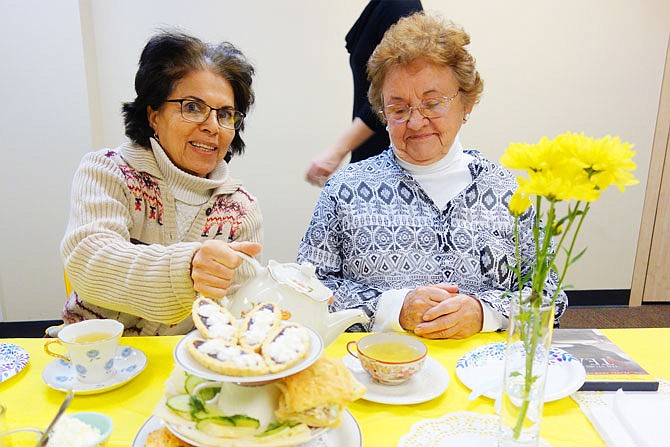Tea is all about slowing down.
During a leisurely tea party at the Callaway County Public Library, Alex Moore shared her enthusiasm for the tradition. She brought three types of tea, a number of dainties and a cup and saucer for each participant to keep.
Her own love of tea came from her husband's grandmother, she said.
"She's Japanese, and she always drank green tea instead of coffee," Moore explained. "With coffee, you grab a cup and run out the door, but with tea, it's sit down and talk."
In fact, certain compounds in tea have calming qualities that counterbalance the caffeine, she said.
"It ensures that you sit and relax," Moore said.
After growing to appreciate the ritual of making and drinking tea, Moore soon began to try many different types of tea from around the world.
All true teas, Moore said, are made from a single plant: Camellia sinensis. Even such wildly different teas as a green tea and a hearty Irish breakfast tea comes from the tea plant's leaves and buds. Herbal "teas" that don't contain Camellia sinensis leaves are technically called tisanes, a French term meaning "herbal infusion."
"It's all how it's processed," Moore said.
Depending on the type of tea a tea leaf is destined to be, it may be dried, roasted, fermented and/or twisted just so.
For the first brew of the afternoon, Moore passed around teapots of Baozhong tea. Baozhong, she said, comes from Taiwan. Its leaves are rolled, twisted and lightly fermented; when steeped, it is pale with a floral fragrance and mildly sweet taste.
She paired it with currant-studded scones, a biscuit-like British pastry, topped with lemon curd and jam.
Like all teas, Baozhong is full of antioxidants, she added.
"Tea is good for all sorts of things," Moore said.
Next up was Darjeeling, sometimes called the "Champagne of teas." It and Assam are produced in India. Darjeeling is grown high in the mountains in India's Darjeeling district, while Assam grows in the lowlands. Typically, the tea plants produced in Darjeeling are processed as a black tea, though white and oolong variants also exist.
"Tea is kind of like wine in that it absorbs the flavors it grows around," Moore said. "With Assams, I've had some that taste like sweet potato and some that taste like tobacco."
Some destined for fancy brews may be grown near jasmine plants, so as to pick up the jasmine's flavor, she said.
With a bold and spiced flavor, Darjeeling tea goes well with savory sandwiches such as chicken salad and cucumber.
Lastly, Moore shared a special pumpkin spice blend from Tea Market in Kansas City, which she served with a chocolate pastry.
In addition to brews and food, Moore also shared knowledge about how to properly prepare tea. Different types should be steeped at different temperatures. If your water is too hot, the tea may burn and develop a bitter flavor.
"Green tea gets bitter very fast and should only be steeped for one minute at about 170 to 180 degrees," she said.
A black or oolong tea can be made with almost-boiling water, while a white tea can be steeped at 180-185 degrees.
Class participant Zahra Dashtaki said in her original country, Iran, black tea is often simmered for five to six minutes before being sweetened and served.
"What's your opinion on a teabag and a microwave?" participant Beverley Gray asked.
Moore clapped a dramatic hand to her chest.
"Teabags are dust and crumbs," she said.
Moore added some modern electric teakettles allow the user to select the perfect temperature for their type of tea.
On Dec. 13, Moore will host a second class focused on tea blending and tea-related holiday gift ideas. Call the Callaway County Public Library at 573-642-7261 to register.

